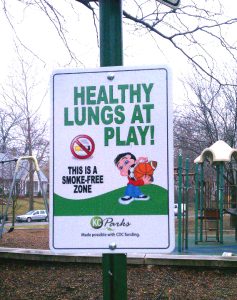 As part of the effort to provide healthier, safer, environments for area residents, the City of Kansas City, Missouri Parks and Recreation recently implemented a smoke-free parks policy in all city owned parks where people, especially where children and youth play and congregate, including, but not limited to the playgrounds, athletic fields, pools, and community centers.
As part of the effort to provide healthier, safer, environments for area residents, the City of Kansas City, Missouri Parks and Recreation recently implemented a smoke-free parks policy in all city owned parks where people, especially where children and youth play and congregate, including, but not limited to the playgrounds, athletic fields, pools, and community centers.
The Parks and Recreation Department’s Smoke-free Policy development was part of a two-year process of collaborating with the City’s Health Department, as part of a county wide Community Transformation Grant effort funded from the Centers for Disease Control through the Mid America Regional Council (MARC). Data were reviewed on cigarette butts deposits at varied park sites, and 13 parks were piloted as smoke-free prior to the implementation of the smoke-free policy.
Implementation of the new policy included placement of 210 signs in 130 parks, providing “smoke-free” zones for over 437 area park locations that are most frequented by children and families. “Healthy Lungs at Play” signs are now posted in each area park.
Designating parks as smoke-free just makes sense because it:
- Promotes Healthy Communities;
- Builds healthier social norms;
- Creates a healthier environment for children and families;
- Promotes more positive role models for children by parents or others;
- Decreases chronic health conditions due to exposure to tobacco smoke;
- Decreases ER and medical visits due to allergy and asthma attacks from exposure; Second hand smoke can trigger asthma attacks, increase risks for blood clots, and harm blood vessels. Decreases second hand smoke exposure to non-smokers; decreases exposure to the toxins in cigarettes;
- Is green and helps maintain our environments. Cigarettes butts are the most littered item in the world, and they create fire hazards.
- Helps break the connection between sports and tobacco, and recreational leaders become tobacco free role models;
- Supports healthier behaviors among youth;
- Helps smokers to quit, reducing the number of cigarettes smoked; it helps former smokers remain smoke-free; it reduces costs to smokers;
- Reduces maintenance costs;
- Helps reduce deaths caused by smoking.
According to the American Lung Association, cigarette smoking is the number one cause of preventable disease in the United States. The elderly and young populations, as well as people with chronic illnesses, are especially vulnerable to the adverse effects of smoking. The 2006 Surgeon General’s report notes that secondhand smoke causes an estimated 50,000 deaths in adult non-smokers in the United States each year. Involuntarily inhaled smoke (second hand smoke) also causes disease and premature death in children and adults who do not smoke.

